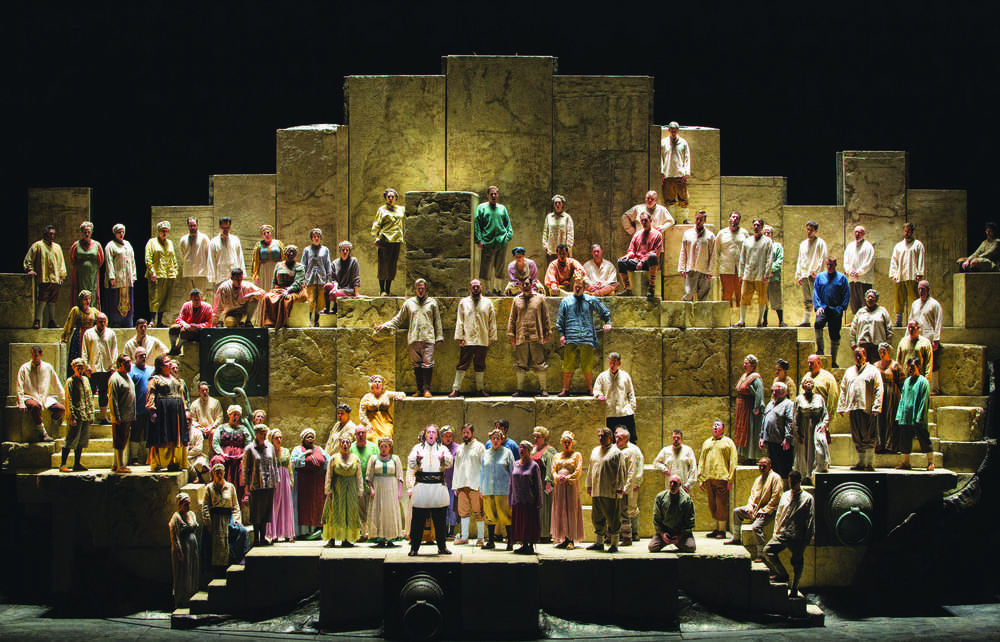Giuseppe Verdi (1831-1901) strides like a giant over the world of opera, and it is impossible to overstate the importance of his contribution to world culture. Equally a great dramatist and a great melodist, Verdi gives us operas that interconnect personal narrative with universal archetypes, masterpieces that split the heart and soul wide open with a longing that binds us to a greater whole.
The Metropolitan Opera’s Live at the Met HD production of Verdi’s “Nabucco” shows at 6 p.m. Jan. 19 at the Homer Theatre followed by his “La Traviata” at 6 p.m. March 23.
Verdi wrote “Nabucco” when he was 26, after a period of such professional and personal anguish — both his young wife and two children had died — that he swore he would never write again. But by chance, or destiny, he happened to glance at some words from a proffered libretto he was discarding: “Va, pensiro, sul ale dorato … O mia patria, si bella e perduta.” (“Fly, thought, on golden wings … Oh my country, so beautiful and so lost.”)
He was at once drawn back to composing, and the result, “Nabucco,” became not only a consummate work of operatic excellence but also a political transducer, for in Verdi we have a rare example of artistic genius effecting historic political change.
It was said that after the premier of “Nabucco,” all Italy was clapping. And that clapping grew in volume to incite a national rebellion that birthed an entire nation. The opera’s significance is multivalent.
“Nabucco,” Italian for Nebuchadnezzar, dramatizes the destruction of the temple of Jerusalem and subsequent enslavement of the Hebrew people in Babylon. It is, as well, a love story and an intrigue of Oresteian family dynamics, involving betrayal, madness and redemption. Filled with sweeping choral scenes, passionate duets and swelling, ever evolving melodies, it unfolds all that would mark Verdi’s entire artistic vision. Yet to explain its transformative social impact, it is necessary to set the opera in its historical context.
Verdi was actively engaged in the politics of his time, an era in which Italy was fighting to oust the many foreign nation states that had been occupying and ruling the various regions of the peninsula. A movement of unification, the Risogimento, fermented and grew, fulminating rebellion and war. The north of Italy, Verdi’s homeland, was under the control of Austria, and tension between the people and the usurping rulers was a powder keg waiting to ignite.
Nabucco’s story of the Hebrew slaves fighting their bondage in Babylon was a conscious if thinly veiled metaphor written purposefully to elicit identification, incite Italians to liberate themselves from Austria, and claim their own Italian ruler.
The letters V- E -R- D- I became a universally acknowledged acronym for Vittorio Emanuele Re d’Italia, the leader that Italians wanted to rule. The cry “VIVA VERDI” that rang out all over Italy, ostensibly acknowledging the composer and therefore ignored by the ruling Austrians, was in truth a call to arms. So when the Hebrew slaves sang the evocative “Va, pensiro …” chorus, it was the voice of the Italian soul singing for its rightful homeland, longing for freedom from Austria.
At the deepest level, the territory of true art, it is the voice of all of us universally yearning for home, that often elusive belonging that we continue to seek in the core of our being. It is not often that art actively and effectively helps to shape and form political structure. There are many examples of artists creating works of political reaction and protest, but few produce effective change.
As an artist, Verdi would have written “Nabucco” regardless of its social impact, as he was called to create from that inspiration that engenders true creativity. Yet the “Va pensiero…” chorus not only became the anthem of the Risorgimento and helped form Italy, it also wove itself into the permanent heart of the Italian people. Italians still consider it to be Italy’s unofficial but true national anthem, and at any public gathering in contemporary Italy, people may still spontaneously sing this powerful and prayerful refrain: “Va pensirero, sul ale dorate … O mia patria, si bella e perduta.” Fly thought, on golden wings …. Oh my country, so beautiful and lost.
Jo Going’s great-grandfather was a captain in Garibaldi’s army during the Risorgimento that birthed Italy. Family myth believes he was inspired by “Nabucco.”
The Metropolitan Opera production
Live at the Met HD video broadcast
Verdi’s Nabucco
6 p.m. Jan. 19 at the Homer Theater
Verdi’s La Traviata
6 p.m. March 23


